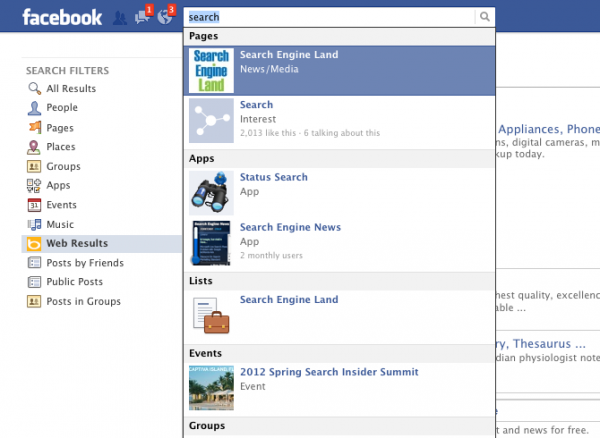How Serious Is Facebook About Search?
An article in BusinessWeek suggests that Facebook is planning a deeper push into search. Will that be limited to improving search for the site — or will it be something more comprehensive? It’s clear that Facebook needs better internal search. Right now the search function at the top of the page is not very useful. […]

It’s clear that Facebook needs better internal search. Right now the search function at the top of the page is not very useful. Improving Facebook site search seems to be the first objective of an internal team, led by former Googler Lars Rasmussen, according to BusinessWeek;
Searching the social network could get a lot better in the near future. About two dozen Facebook engineers, led by a former Google engineer named Lars Rasmussen, are working on an improved search engine, say two people familiar with the project who did not want to be named because the company is in a quiet period ahead of its IPO. The goal, they say, is to help users better sift through the volume of content that members create on the site, such as status updates, and the articles, videos, and other information across the Web that people “like” using Facebook’s omnipresent thumbs-up button.
Better Site Search Would Increase Query Volumes
There’s no question that an improved search capability would benefit Facebook in several ways. It would encourage more search activity among users, who would be rewarded with a better experience, creating a self-reinforcing cycle. It would also create a PPC ad opportunity that is probably too lucrative for Facebook to ignore.
Facebook could sell contextual or keyword-based PPC ads in search results. There’s probably pent-up demand for such a program. It’s a natural for the site and a monetization opportunity that Facebook will be compelled to adopt.
Facebook Not Likely to Directly Challenge Google
It’s unlikely in the near term that Facebook would seek to challenge Google directly in web search. The first reason is the company’s relationship with Bing, which prevents the move in the near term at least. The second reason is that it would take a huge resource commitment from Facebook. There’s enormous exposure there; consider how much Microsoft has been losing over a period of years in trying to catch Google.
Yet Facebook doesn’t need to challenge Google directly in web search. Improving search on the Facebook site — including a better layout and presentation of results — wouldn’t be anywhere as difficult as general web search. It would also be welcomed by users — and certainly by advertisers, provided there were PPC opportunities. And I would almost guarantee some version of paid-search advertising on Facebook is “on the roadmap.”
Hundreds of Millions in Revenue “on the Table”
According to the BusinessWeek article (using comScore data) Facebook users performed 336 million search queries in February. If Facebook fixed search that number would immediately go up and could translate into hundreds of millions of dollars in new annual revenue for the company. Institutional investors will all but demand such a move after the IPO.
In the recently released Local Search Usage Study from comScore, Localeze and agency 15 Miles, the data reflect that “use of social networking sites for local business searches has increased 67 percent since 2010.” With better Facebook site search those numbers would likely only get bigger.
Contributing authors are invited to create content for Search Engine Land and are chosen for their expertise and contribution to the search community. Our contributors work under the oversight of the editorial staff and contributions are checked for quality and relevance to our readers. The opinions they express are their own.
Related stories
